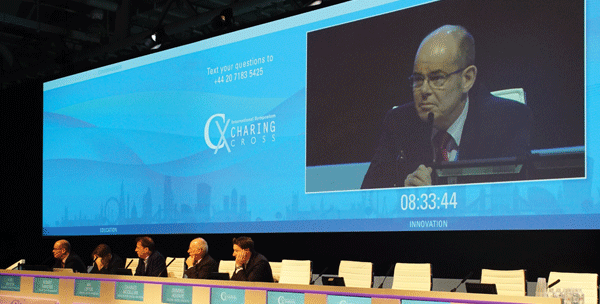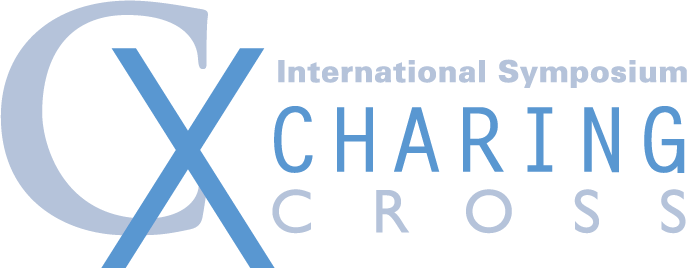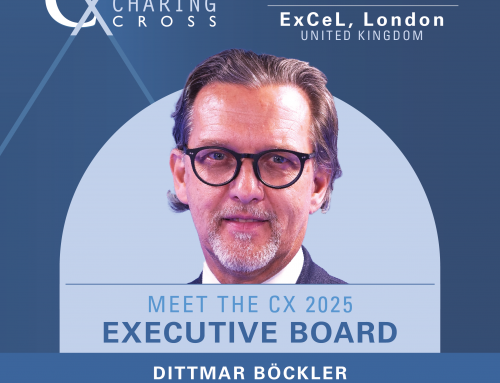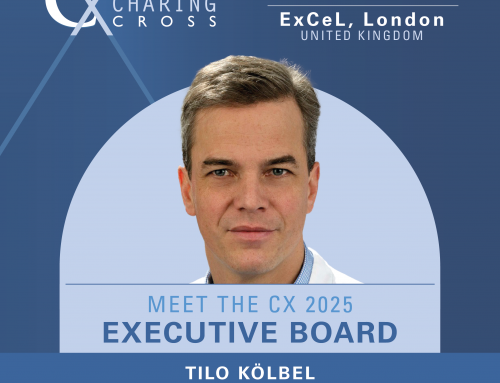
Ross Naylor at CX 2017
CX 2018 will close with the Acute Stroke CONTROVERSIES programme, which Ross Naylor—a member of the CX Programme Organising Board—promises will be a memorable session. The highlight will be five debates that will address a few “sacred cows” that arouse considerable controversy around the world. CX News spoke to Ross Naylor (Leicester, UK) about the focus of this year’s CX Acute Stroke programme.
What are the most interesting areas that will be covered in the Acute Stroke Controversies programme?
Acute Stroke Controversies includes a diverse collection of controversies and debates that will be of interest to vascular surgeons, interventionists, cardiologists and stroke physicians. Aside from our five debates (see below), the Controversies Panel will discuss novel carotid stent technologies, whether there is a role for carotid interventions in patients with asymptomatic carotid stenoses undergoing major non-cardiac surgery; is there a role for carotid interventions in preventing (reversing) dementia; how safe is protamine reversal during CEA, what is the current status of CCSVI and we close the second session with an alternative interpretation of the SAMMPRIS trial findings.
What techniques and technologies will be highlighted at the session?
We will be looking at various aspects of performing CEA and CAS, including techniques/strategies for making surgery or stenting safer, including completion assessment and protamine reversal during CEA and the latest results of the US SCAFFOLD clinical study involving a novel carotid stent design, as well as quantitative analysis of filter debris loads during CAS
What do you think are the biggest controversies in acute stroke treatment today?
The key controversies to be addressed include the timing (and safety) of carotid interventions in the early time period after onset of symptoms; the role of vertebrobasilar stenting in symptomatic patients; screening for asymptomatic carotid disease and whether there is a role for carotid interventions to prevent dementia.
There are five debates in the Carotid controversies programme—what are the key topics and what can the audience hope to learn more about?
We have allocated two hours for five excellent debates. The first sees Barbara Rantner (Germany) proposing that CEA still remains the first line intervention in the early time period after onset of symptoms, with Peter Schneider (USA) proposing that modern CAS techniques make CAS just as safe as surgery in this situation. The second debate pitches Hans-Henning Eckstein (Germany) against Alun Davies (UK) as to whether completion assessment should be mandatory during carotid endarterectomy. The third debate sees Ross Naylor (U) defending the position that the majority of patients do not require surveillance or reintervention after CEA and CAS, whilst Bill Gray (USA) opposes this motion. The fourth debate proposes that vertebral artery stenting should only be performed in patients with recurrent symptoms (with the majority being treated medically), a position opposed by Nick Hopkins (USA). The final debate sees Rao Vallabheni (UK) defending the proposal that there is no role for screening to detect asymptomatic carotid stenoses, which is opposed by Andrew Nicolaides (Cyprus). All of our debaters are known for their expertise, wit and debating style and a memorable session is anticipated for all of our participants and audience.
What key data should delegates expect from the Acute Stroke Abstract Presentations?
I would hope that the delegates will have a better understanding of how to plan early interventions and treatment strategies in patients with symptomatic carotid and vertebral disease and how to address a few ‘sacred cows’ that arouse considerable debate around the world, especially surveillance after carotid interventions, interventions to ‘prevent’ dementia and screening for asymptomatic carotid disease.







